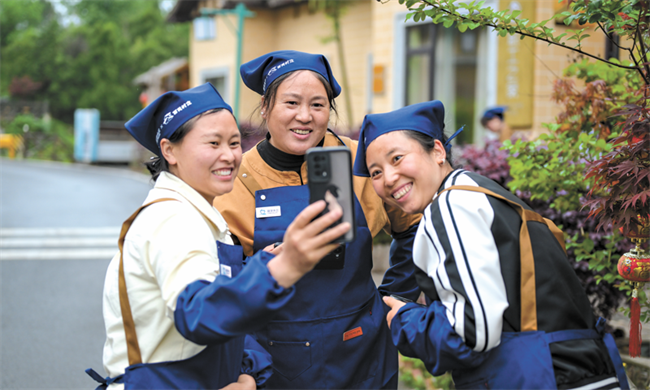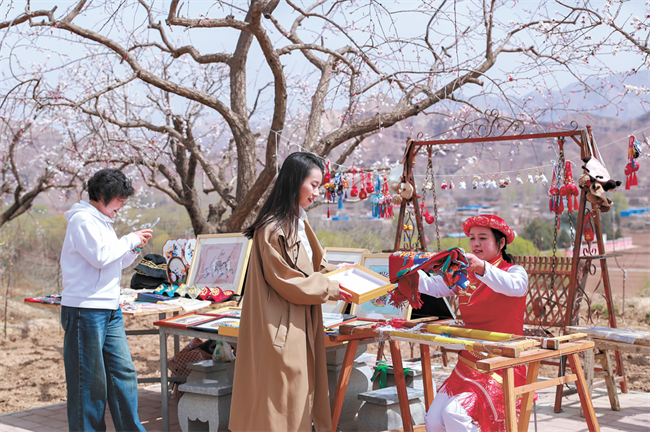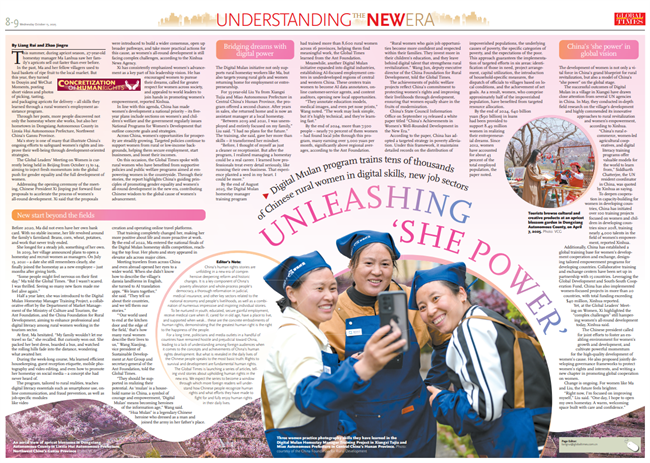
Editor's Note:
China's human rights stories are unfolding in a new era of comprehensive deepening reform and historic changes. It is a key component of China's poverty alleviation and whole-process people's democracy, a thorough reformation in judicial, medical insurance, and other key sectors related to the national economy and people's livelihoods, as well as a combination of numerous impressive and inspiring individual stories.
To be nurtured in youth, educated, secure gainful employment, receive medical care when ill, cared for in old age, have a place to live, and supported when weak... these are the concrete embodiments of human rights, demonstrating that the greatest human right is the right to the happiness of the people.
For a long time, politicians and media outlets in a handful of countries have remained hostile and prejudicial toward China, leading to a lack of understanding among foreign audiences when it comes to the concepts and achievements of China's human rights development. But what is revealed in the daily lives of the Chinese people speaks to the most basic truth: Rights to survival and development are fundamental human rights.
The Global Times is launching a series of articles, telling vivid stories about upholding human rights in the new era. We expect the series to become a window through which more foreign readers will understand how Chinese people recognize human rights and what efforts they have made to fight for and fully enjoy human rights in their daily lives.
This summer, during apricot season, 27-year-old homestay manager Ma Lanhua saw her family's apricots sell out faster than ever before.
In the past, Ma and her fellow villagers used to haul baskets of ripe fruit to the local market. But this year, they turned to Douyin and WeChat Moments, posting short videos and photos of picking, tasting, and packaging apricots for delivery - all skills they learned through a rural women's employment assistance program.
Through her posts, more people discovered not only the homestay where she works, but also her hometown in Dongxiang Autonomous County in Linxia Hui Autonomous Prefecture, Northwest China's Gansu Province.
Ma's story is one of many that illustrate China's ongoing efforts to safeguard women's rights and improve their well-being through development-oriented strategies.
The Global Leaders' Meeting on Women is currently being held in Beijing from October 13 to 14, aiming to inject fresh momentum into the global push for gender equality and the full development of women.
Addressing the opening ceremony of the meeting, Chinese President Xi Jinping put forward four proposals to accelerate the process of women's all-round development. Xi said that the proposals were introduced to build a wider consensus, open up broader pathways, and take more practical actions for this cause, as women's all-round development is still facing complex challenges, according to the Xinhua News Agency.
Xi has consistently emphasized women's advancement as a key part of his leadership vision. He has encouraged women to pursue their dreams, called for greater respect for women across society, and appealed to world leaders to join hands in promoting women's empowerment, reported Xinhua.
In line with this agenda, China has made women's development a national priority - its five-year plans include sections on women's and children's welfare and the government regularly issues National Programs for Women's Development that outline concrete goals and strategies.
Across China, women's opportunities for prosperity are steadily growing. Targeted policies continue to support women from rural or low-income backgrounds, helping them secure employment, start businesses, and boost their incomes.
On this occasion, the Global Times spoke with rural women who have benefited from supportive policies and public welfare programs aimed at empowering women in the countryside. Through their stories, the report highlights China's guiding principles of promoting gender equality and women's all-round development in the new era, contributing Chinese wisdom to the global cause of women's advancement.

An aerial view of apricot blossoms in Dongxiang Autonomous County in Linxia Hui Autonomous Prefecture, Northwest China's Gansu Province Photo: VCG
New start beyond the fields
Before 2020, Ma did not even have her own bank card. With no stable income, her life revolved around the family's farmland: Beans, corn, wheat, potatoes, and work that never truly ended.
She longed for a steady job, something of her own.
In 2019, her village announced plans to open a homestay and recruit women as managers. On July 13, 2021 - a date she still remembers clearly, she finally joined the homestay as a new employee - just months after giving birth.
"Some people might feel nervous on their first day," Ma told the Global Times. "But I wasn't scared. I was thrilled. Seeing so many new faces made me feel alive again."
Half a year later, she was introduced to the Digital Mulan Homestay Manager Training Project, a collaborative effort by the Department of Market Management of the Ministry of Culture and Tourism, the Ant Foundation, and the China Foundation for Rural Development, aiming to enhance professional and digital literacy among rural women working in the tourism sector.
At first, Ma hesitated. "My family wouldn't let me travel so far," she recalled. But curiosity won out. She packed her best dress, boarded a bus, and watched the rolling hills fade into the distance, wondering what awaited her.
During the week-long course, Ma learned efficient housekeeping, guest reception etiquette, mobile photography and video editing, and even how to promote her homestay on social media - a concept she had never heard of.
The program, tailored to rural realities, teaches digital literacy essentials such as smartphone use, online communication, and fraud prevention, as well as job-specific modules like video creation and operating online travel platforms.
That training completely changed her, making her more positive about life and more proactive at work. By the end of 2022, Ma entered the national finals of the Digital Mulan homestay skills competition, reaching the top four. Her photo and story appeared in elevator ads across major cities.
Meeting travelers from across China and even abroad opened her eyes to a wider world. When she didn't know how to describe the village's danxia landforms in English, she turned to AI translation apps. "We learn together," she said. "They tell us about their countries, and we tell them our stories."
"'Our world used to end at the kitchen door and the edge of the field,' that's how many rural women describe their lives to us," Wang Xiaojing, vice president of Sustainable Development at Ant Group and secretary-general of the Ant Foundation, told the Global Times.
"They should be supported in realizing their potential. As 'mulan' is a household name in China, a symbol of courage and empowerment, 'Digital Mulan' means becoming heroines of the information age," Wang said. "Hua Mulan" is a legendary Chinese heroine who dressed as a man and joined the army in her father's place.
New start beyond the fields
Before 2020, Ma did not even have her own bank card. With no stable income, her life revolved around the family's farmland: Beans, corn, wheat, potatoes, and work that never truly ended.
She longed for a steady job, something of her own.
In 2019, her village announced plans to open a homestay and recruit women as managers. On July 13, 2021 - a date she still remembers clearly, she finally joined the homestay as a new employee - just months after giving birth.
"Some people might feel nervous on their first day," Ma told the Global Times. "But I wasn't scared. I was thrilled. Seeing so many new faces made me feel alive again."
Half a year later, she was introduced to the Digital Mulan Homestay Manager Training Project, a collaborative effort by the Department of Market Management of the Ministry of Culture and Tourism, the Ant Foundation, and the China Foundation for Rural Development, aiming to enhance professional and digital literacy among rural women working in the tourism sector.
At first, Ma hesitated. "My family wouldn't let me travel so far," she recalled. But curiosity won out. She packed her best dress, boarded a bus, and watched the rolling hills fade into the distance, wondering what awaited her.
During the week-long course, Ma learned efficient housekeeping, guest reception etiquette, mobile photography and video editing, and even how to promote her homestay on social media - a concept she had never heard of.
The program, tailored to rural realities, teaches digital literacy essentials such as smartphone use, online communication, and fraud prevention, as well as job-specific modules like video creation and operating online travel platforms.
That training completely changed her, making her more positive about life and more proactive at work. By the end of 2022, Ma entered the national finals of the Digital Mulan homestay skills competition, reaching the top four. Her photo and story appeared in elevator ads across major cities.
Meeting travelers from across China and even abroad opened her eyes to a wider world. When she didn't know how to describe the village's danxia landforms in English, she turned to AI translation apps. "We learn together," she said. "They tell us about their countries, and we tell them our stories."
"'Our world used to end at the kitchen door and the edge of the field,' that's how many rural women describe their lives to us," Wang Xiaojing, vice president of Sustainable Development at Ant Group and secretary-general of the Ant Foundation, told the Global Times.
"They should be supported in realizing their potential. As 'mulan' is a household name in China, a symbol of courage and empowerment, 'Digital Mulan' means becoming heroines of the information age," Wang said. "Hua Mulan" is a legendary Chinese heroine who dressed as a man and joined the army in her father's place.

Tourists browse cultural and creative products at an apricot blossom garden in Dongxiang Autonomous County, on April 7, 2025. Photo: VCG
Bridging dreams with digital power
The Digital Mulan initiative not only supports rural homestay workers like Ma, but also targets young rural girls and women returning home for employment or entrepreneurship.
For 35-year-old Liu Yu from Xiangxi Tujia and Miao Autonomous Prefecture in Central China's Hunan Province, the program offered a second chance. After years in sales, she returned home and is now an assistant manager at a local homestay.
"Between 2019 and 2021, I was unemployed and entirely focused on my family," Liu said. "I had no plans for the future." The training, she said, gave her more than skills - it transformed her mindset.
"Before, I thought of myself as just a cleaner or receptionist. But after the program, I realized managing a homestay could be a real career. I learned how professionals treat every detail seriously, like running their own business. That experience planted a seed in my heart. I could be more."
By the end of August 2025, the Digital Mulan homestay manager training program had trained more than 8,600 rural women across 16 provinces, helping them find meaningful work, the Global Times learned from the Ant Foundation.
Meanwhile, another Digital Mulan initiative expanded into digital industries, establishing AI-focused employment centers in underdeveloped regions of central and western China. These centers train women to become AI data annotators, online customer-service agents, and content auditors, opening new local opportunities.
"They annotate education models, medical images, and even pet nose prints," Wang noted. "The work may look simple, but it's highly technical, and they're learning fast."
By the end of 2024, more than 7,500 people - nearly 70 percent of them women - had found local jobs through this program, many earning over 3,000 yuan per month, significantly above regional averages, according to the Ant Foundation.
"Rural women who gain job opportunities become more confident and respected within their families. They invest more in their children's education, and they leave behind digital talent that strengthens rural revitalization." Wang Jun, deputy executive director of the China Foundation for Rural Development, told the Global Times.
The achievements of public welfare projects reflect China's commitment to protecting women's rights and improving their livelihoods through development, ensuring that women equally share in the fruits of modernization.
China's State Council Information Office on September 19 released a white paper titled "China's Achievements in Women's Well-Rounded Development in the New Era."
According to the paper, China has adopted a targeted strategy in poverty alleviation. Under this framework, it maintains detailed records on the distribution of impoverished populations, the underlying causes of poverty, the specific categories of poverty, and the expectations of the poor. This approach guarantees the implementation of targeted efforts in six areas: identification of those in need, project arrangement, capital utilization, the introduction of household-specific measures, the dispatch of officials to villages based on local conditions, and the achievement of set goals. As a result, women, who comprise approximately half of the impoverished population, have benefited from targeted resource allocation.
By the end of 2024, 640 billion yuan ($90 billion) in loans had been provided to support 8.49 million women in realizing their entrepreneurial dreams. Since 2012, women have accounted for about 43 percent of the total employed population, the paper noted.
China's 'she power' in global vision
The development of women is not only a vital force in China's grand blueprint for rural revitalization, but also a model of China's "she power" on the global stage.
The successful outcomes of Digital Mulan in a village in Xiangxi have drawn close attention from several UN agencies in China. In May, they conducted in-depth field research on the village's development and highly commended its innovative approaches to rural revitalization and women's empowerment, according to Xinhua.
"China's rural e-commerce, women-led agricultural cooperatives, and digital literacy training programs offer valuable models for the world to learn from," Siddharth Chatterjee, the UN resident coordinator in China, was quoted by Xinhua as saying.
To deepen cooperation in capacity-building for women in developing countries, China has initiated over 100 training projects focused on women and children in developing countries since 2018, training nearly 4,000 talents in the field of women's empowerment, reported Xinhua.
Additionally, China has established a global training base for women's development cooperation and exchange, designing tailored empowerment programs for developing countries. Collaborative training and exchange centers have been set up in partnership with 15 countries. Leveraging the Global Development and South-South Cooperation Fund, China has also implemented women-focused projects in more than 20 countries, with total funding exceeding $40 million, Xinhua reported.
Yet, at the Global Leaders' Meeting on Women, Xi highlighted the "complex challenges" still hampering women's all-round development today, Xinhua said.
The Chinese president called for joint efforts to foster an enabling environment for women's growth and development, and cultivate powerful momentum for the high-quality development of women's cause. He also proposed jointly developing governance frameworks to protect women's rights and interests, and writing a new chapter in promoting global cooperation on women.
Change is ongoing. For women like Ma and Liu, the future feels brighter.
"Right now, I'm focused on improving myself," Liu said. "One day, I hope to open my own homestay. A warm, welcoming space built with care and confidence."
Bridging dreams with digital power
The Digital Mulan initiative not only supports rural homestay workers like Ma, but also targets young rural girls and women returning home for employment or entrepreneurship.
For 35-year-old Liu Yu from Xiangxi Tujia and Miao Autonomous Prefecture in Central China's Hunan Province, the program offered a second chance. After years in sales, she returned home and is now an assistant manager at a local homestay.
"Between 2019 and 2021, I was unemployed and entirely focused on my family," Liu said. "I had no plans for the future." The training, she said, gave her more than skills - it transformed her mindset.
"Before, I thought of myself as just a cleaner or receptionist. But after the program, I realized managing a homestay could be a real career. I learned how professionals treat every detail seriously, like running their own business. That experience planted a seed in my heart. I could be more."
By the end of August 2025, the Digital Mulan homestay manager training program had trained more than 8,600 rural women across 16 provinces, helping them find meaningful work, the Global Times learned from the Ant Foundation.
Meanwhile, another Digital Mulan initiative expanded into digital industries, establishing AI-focused employment centers in underdeveloped regions of central and western China. These centers train women to become AI data annotators, online customer-service agents, and content auditors, opening new local opportunities.
"They annotate education models, medical images, and even pet nose prints," Wang noted. "The work may look simple, but it's highly technical, and they're learning fast."
By the end of 2024, more than 7,500 people - nearly 70 percent of them women - had found local jobs through this program, many earning over 3,000 yuan per month, significantly above regional averages, according to the Ant Foundation.
"Rural women who gain job opportunities become more confident and respected within their families. They invest more in their children's education, and they leave behind digital talent that strengthens rural revitalization." Wang Jun, deputy executive director of the China Foundation for Rural Development, told the Global Times.
The achievements of public welfare projects reflect China's commitment to protecting women's rights and improving their livelihoods through development, ensuring that women equally share in the fruits of modernization.
China's State Council Information Office on September 19 released a white paper titled "China's Achievements in Women's Well-Rounded Development in the New Era."
According to the paper, China has adopted a targeted strategy in poverty alleviation. Under this framework, it maintains detailed records on the distribution of impoverished populations, the underlying causes of poverty, the specific categories of poverty, and the expectations of the poor. This approach guarantees the implementation of targeted efforts in six areas: identification of those in need, project arrangement, capital utilization, the introduction of household-specific measures, the dispatch of officials to villages based on local conditions, and the achievement of set goals. As a result, women, who comprise approximately half of the impoverished population, have benefited from targeted resource allocation.
By the end of 2024, 640 billion yuan ($90 billion) in loans had been provided to support 8.49 million women in realizing their entrepreneurial dreams. Since 2012, women have accounted for about 43 percent of the total employed population, the paper noted.
China's 'she power' in global vision
The development of women is not only a vital force in China's grand blueprint for rural revitalization, but also a model of China's "she power" on the global stage.
The successful outcomes of Digital Mulan in a village in Xiangxi have drawn close attention from several UN agencies in China. In May, they conducted in-depth field research on the village's development and highly commended its innovative approaches to rural revitalization and women's empowerment, according to Xinhua.
"China's rural e-commerce, women-led agricultural cooperatives, and digital literacy training programs offer valuable models for the world to learn from," Siddharth Chatterjee, the UN resident coordinator in China, was quoted by Xinhua as saying.
To deepen cooperation in capacity-building for women in developing countries, China has initiated over 100 training projects focused on women and children in developing countries since 2018, training nearly 4,000 talents in the field of women's empowerment, reported Xinhua.
Additionally, China has established a global training base for women's development cooperation and exchange, designing tailored empowerment programs for developing countries. Collaborative training and exchange centers have been set up in partnership with 15 countries. Leveraging the Global Development and South-South Cooperation Fund, China has also implemented women-focused projects in more than 20 countries, with total funding exceeding $40 million, Xinhua reported.
Yet, at the Global Leaders' Meeting on Women, Xi highlighted the "complex challenges" still hampering women's all-round development today, Xinhua said.
The Chinese president called for joint efforts to foster an enabling environment for women's growth and development, and cultivate powerful momentum for the high-quality development of women's cause. He also proposed jointly developing governance frameworks to protect women's rights and interests, and writing a new chapter in promoting global cooperation on women.
Change is ongoing. For women like Ma and Liu, the future feels brighter.
"Right now, I'm focused on improving myself," Liu said. "One day, I hope to open my own homestay. A warm, welcoming space built with care and confidence."

Unleashing 'She Power'
Source: Global Times








